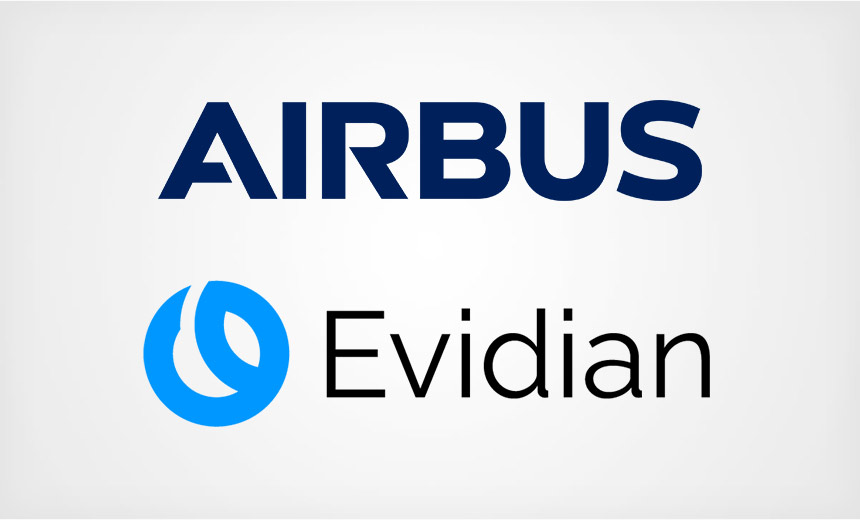Endpoint Security
,
Next-Generation Technologies & Secure Development
,
Security Operations
Owning a Piece of Evidian Would Help Airbus Guard Communication Systems in Vehicles

Airbus has once again expressed interest in Atos’ $4.8 billion cybersecurity, big data and digital business – this time as a minority stakeholder, Les Echos reports.
See Also: Spotlight Session I Trends In SOC Innovation & Managing Endpoint Security Challenges
The Dutch aircraft manufacturer has started exploratory talks to take a noncontrolling interest in Atos’ Evidian business, which Atos intends to stand up as a separate, publicly listed company by the end of 2023, Les Echos says. After the split, Atos would be focused solely on its $6.99 billion infrastructure and data management business as well as its $4.38 billion business and platform solutions unit.
“The company has engaged exploratory discussions with potential future minority stakeholders for the scope of activities bundled under the name ‘Evidian,'” Atos tells Information Security Media Group in a statement. “These discussions are not advanced enough to allow for further comment.”
The Paris-based conglomerate says it intends to maintain up to a 30% stake in Evidian following the separation and will use proceeds from selling partial ownership in Evidian to bankroll its transformation plan for the rest of Atos. Sales in the company’s infrastructure and data management and business and platform solutions divisions fell by 3% and 7.9%, respectively, in 2020.
Airbus tells ISMG that it doesn’t comment on market rumors or speculation. “As a global company, we are in constant discussion with our partners, customers and suppliers across the industry, but these conversations remain private in nature.”
A minority stake would be of strategic interest for Airbus, which is a key defense industry contractor, Les Echos reports. By taking a stake in Evidian, Airbus would facilitate access to the secure communications systems it installs in the military vehicles it produces, according to Les Echos.
The latest acquisition fodder comes 10 months after France’s BMV TV reported that Airbus had been looking into a potential acquisition of Atos driven by its interest in the field of cybersecurity. At the time, Airbus opted to not buy Atos as a whole since it had no interest in the company’s other activities, while Atos maintained in March 2022 that its Evidian division wasn’t for sale.
Investors in Atos have reacted favorably to reports of Airbus’ interest, sending the company’s stock up 26.9%, or $2.42, to $11.43 per share in trading since the Les Echos report came out Jan. 1. Similarly, Airbus’ stock is up 3.9%, or $4.36, to $111.02 per share since the Les Echos report appeared.
Airbus Goes All-In on Cybersecurity
Airbus has historically had three divisions: a $40.11 billion commercial aircraft business, which grew by 6% in 2021; an $11.3 billion defense and space business, which contracted by 2% in 2021; and a $7.22 billion helicopter business, which grew by 4% in 2021. Cybersecurity has been part of Airbus’ defense and space unit and includes security operations centers, incident response services and cryptography for NATO countries.
The company in June announced plans to bring all existing cybersecurity services into a single division called Airbus Protect and make investments to strengthen Airbus’ overall cybersecurity activities. Airbus Protect debuted July 1, 2022. It has more than 1,000 employees across France, the United Kingdom, Spain and Germany, and it focuses on industrial cybersecurity, critical infrastructure and safety services (see: Airbus Sets Up Cybersecurity-Focused Organization).
Airbus last year bought German cryptography and communication systems provider DSI Datensicherheit to better serve companies in the space, aviation, naval and land sectors. The deal will bring together cybersecurity teams focused on cryptography for defense with space customers and programs, according to Airbus.
In addition, Airbus operates a 400-person cybersecurity subsidiary in Europe called Stormshield that sells data, endpoint and network security technology. Airbus last year said it would increase research and development activities around Stormshield to enrich the company’s portfolio in network security, data encryption and endpoint detection and response.
Airbus Talks Follow Atos Rebuff of Onepoint
Airbus’ exploratory discussions around selling a stake in Evidian come just three months after the company rejected a $4.12 billion offer from rival Onepoint to acquire Evidian outright. Onepoint planned to team up with British private equity fund ICG to finance the transaction, which Onepoint founder David Layani said would create 20,000 jobs in Europe.
Atos, however, said in September that its board of directors unanimously decided the Onepoint offer wasn’t in the interest of the company and its stakeholders (see: Atos Rejects $4.12B Onepoint Bid for Cybersecurity Business).
Revenue for Atos’ Evidian business in the first half of 2022 inched up to $2.49 billion, just 2% higher than the $2.44 billion the year prior on a constant currency basis, thanks to above-market growth from the company’s cybersecurity practice. Evidian has 50,000 employees focused on its $3.43 billion digital transformation business and 9,000 employees serving its $1.38 billion big data and security practice.
Atos says Evidian’s cybersecurity practice enjoys high single-digit operating margins and was recognized by Gartner as the top managed security services vendor in the world. Atos’ big data and security practice benefited from an aggressive acquisition strategy – the company bought German cryptography specialist Cryptovision in September 2021 and Canadian cybersecurity consulting firm In Fidem in January 2021.
In late 2020, Atos purchased Austrian consulting provider SEC Consult Group and Netherlands-based company Motiv ICT Security, as well as Reston, Virginia-based managed detection and response provider Paladion and Paris-headquartered firm Digital Security.
